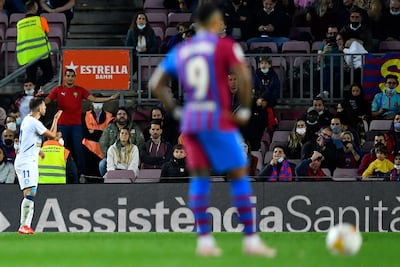Camp Nou, the biggest football club stadium in the world regularly used by one team, holds 99,354 and with all Covid restrictions dropped, the full capacity was permitted for Barcelona's game against Alaves last Saturday.
Yet almost two thirds of the giant stadium was empty and a crowd of just 37,278 watched Barca struggle to overcome lowly Alaves, shining another spotlight on the club and their problems in a week when they sacked coach Ronald Koeman.
It was their lowest attendance for a weekend game for more than 20 years, and there are multiple reasons why numbers have fallen so much.
Judged by average home gates, the Catalans have been one of the best three supported teams in the world for much of this century, along with Manchester United and Borussia Dortmund. Barca’s average crowd was more than 70,000 for 13 consecutive seasons from 2004 to 2017. As recently as 2018-19, the last full season before Covid, their average home league attendance was 76,051.
The picture looks very different this season, and even the clasico didn’t sell out last week although the 86,000 was more than twice that of Saturday’s disappointing draw against the Basques.
A holiday weekend didn’t help, nor does a poorer team without star attraction Lionel Messi. The loss of the Argentine means there are far fewer football tourists at games.
“Losing Messi combining with Covid is a total disaster,” explained Charles Hamilton who runs a company specialising in hospitality at major clubs around Europe. “The party is over for now, but let’s see what this season brings. We sold out of our entire allocation of PSG tickets within five days of Messi moving there.”
Messi’s departure wasn’t the only factor. Zlatan Ibrahimovic was once a huge pull for Swedes, Ronaldinho for all fans. Barcelona improved their marketing to cater to burgeoning tourist numbers visiting the Mediterranean city in the mid-noughties onwards and rode a wave which didn’t crash.

The club’s stadium tour was the most popular paid for attraction in Catalonia, merchandise sales surged too. If they wanted to see a game, they paid top money for it. Ticket prices for non-season ticket holders rose and rose. Even now, 18 of the 22 price brackets for Barca’s next two home games are priced between €69–€199. A good standard seat along the side of the pitch is €150. It’s expensive, even for a fan who lives in the city and doesn’t have a season ticket – though Barca offered half price tickets for the recent Valencia and Dynamo Kiev games to tempt fans back. It hasn’t worked.
For so long, the season ticket holders provided the bedrock of support. They still do and the atmosphere has been noisy inside the stadium this season, but more than 26,238 season ticket holders took a one-off option to opt out for this campaign, leaving 57,000 who paid.

“I did not renew,” says Marc Rosell Ricart, whose family have held four season tickets since 1952 when the club played at their old Les Corts stadium. It was not because of the standard of football. “The deadline was in July at a time when no fans were allowed into stadiums. There was uncertainty about what would happen next. The club allowed us the option to not renew for one year and I took it.”
Covid uncertainty is clearly a factor – many of those who attend games are older. Demand has dropped off a cliff. For the first game which fans were allowed back in August 29,000, tickets were made available to season ticket holders. Only 15,000 applied and only 20,384 attended the game against current league leaders Real Sociedad. August traditionally sees lower crowds since so many fans are out of the city in the holiday month, but never this low.
Maybe they’ll come back
“The club emailed us last week to offer us the opportunity to buy our season ticket for this year at the full price. I would have paid it for three-quarters of the price since there’s only three-quarters of the season left,” added Marc. “I still might do it. The price for my season ticket is a good one. And we were attending games before the Messi era when crowds of between 45-60,000 were not unusual. But if Xavi comes back as coach, excitement will rise and crowds will return.” Five thousand of the 26,238 who paused their season tickets have bought them again in recent weeks.
It’s a mixed picture across Spain. Atletico Madrid had a crowd of 56,838 on Sunday, Real Sociedad sold out all 40,000 seat for the Basque derby. Real Madrid are still undergoing an extensive redevelopment of their Bernabeu stadium and have a limited capacity. Real Betis have the same number of season tickets now as pre-covid and boast 45,000 crowds. That will please La Liga, who fined clubs for having empty seats on view to TV cameras before Covid since they wanted to promote a better image to the world.
Barca beaten in clasico
Crowds in Spain have traditionally been lowered because there’s a limited culture of travelling to away games, matches are often rescheduled without the match-going fan in mind and ticket prices for non-season ticket holders can be exorbitant. Barcelona’s €119 price for visiting Manchester United fans in 2019 – for the worst seats in the stadium - is the highest in United’s entire history. The second, third, fourth and fifth highest ticket prices were all for United’s games in Spain, too.
In England, ticket prices at many clubs haven’t increased for a decade while prices for away fans dropped and are pegged at £30 in the Premier League. No wonder then that football attendances in England are enjoying a surge - one which Spain is not capitalising on.
There’s a post covid reaction with people wanting to get out and attend live sports, but gates across different leagues have been rising for three decades. The Premier League is likely to go through an average of 40,000 for the first time ever this season. It’s currently 40,428. If that figure stays it will surpass even those monster averages of the post-World War Two years, while even in non-league many clubs are delighted with their rising crowds.
In Barcelona, the fans were there for the sustained good times from 2004-2019, but how many will stick around and go to the stadium now the going is tough?







































